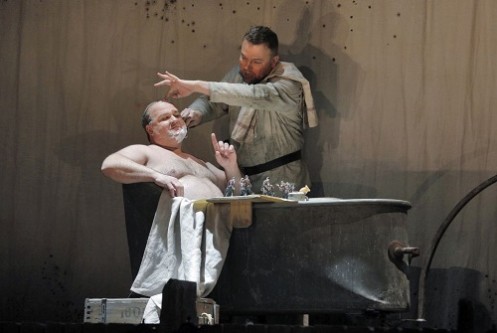 United States Berg, Wozzeck: Soloists, Lyric Opera of Chicago, Sir Andrew Davis (conductor), Civic Opera House, Chicago. 1.11.2015. (JLZ)
United States Berg, Wozzeck: Soloists, Lyric Opera of Chicago, Sir Andrew Davis (conductor), Civic Opera House, Chicago. 1.11.2015. (JLZ)

Berg, Wozzeck
Cast:
Wozzeck: Tomasz Konieczny
Marie: Angela Denoke
Captain: Gerhard Siegel
Drum Major: Stefan Vinke
Doctor: Brindley Sherratt
Andres: David Portillo
Margret: Jill Grove
1st Apprentice: Bradley Smoak
2nd Apprentice: Anthony Clark Evans
Fool: Brenton Ryan
Marie’s Son: Zachary Uzarraga
Production:
Director: Sir David McVicar
Designer: Vicki Mortimer
Lighting Designer: Paule Constable
Chorus Master: Michael Black
Conductor: Sir Andrew Davis
Lyric Opera of Chicago’s new production of Alban Berg’s Wozzeck (1925) is a powerful presentation of this twentieth-century landmark. Director Sir David McVicar uses a number of visual cues to support the drama and reflect the music’s structure, and sets the action around World War I (when Berg wrote the opera) with evocative costumes and set design. A war monument atop the stage dominates the space beneath, while a sliding curtain opens and closes each scene, like a larger-than-life slide projector. This crisp definition supports the tight-knit libretto that Berg assembled from the fragmentary play by Georg Büchner (1836–1837), giving the audience a clear grasp of the opera’s fifteen scenes.
Sir Andrew Davis shaped the score masterfully, with distinct timbres and ideal orchestral balances. More than that, Davis brought out Berg’s sense of line, and the lyricism sometimes hiding in his atonal, dodecaphonic idiom. Tempos were remarkably accurate, never stiff or mannered.
As Wozzeck, Tomasz Konieczny used a resonant rich baritone that exceeded the role’s demands. Whether in his argument about Marie’s earrings (the third scene of Act II), or the final act, when Konieczny sacrificed her—a horrifying scene eclipsed only by the stunning conclusion—he constructed a fully-developed character.
As Marie, Angela Denoke brought passionate intensity, not only in her relationship with Wozzeck, but also their son. The lullaby in the third scene of Act I stood out for its warmth and emotion, and she made the flirtation with the drum major distinct from her familial connections. Denoke not only deftly shaped each line—her native German diction was a huge asset—but gave a wonderful physicality to the role.
With an impressive full bass, Brindley Sherratt brought out the inquisitive nature of the doctor, who dominated Wozzeck almost as strongly as the captain. As Andres, tenor David Portillo was a believable vocal and dramatic foil, even if at times the orchestra obscured him.
The tension between the vocal content and the orchestral fabric is one of the scores’s challenges. It is difficult to imagine the Expressionist libretto without Berg’s music, and strong leadership from the pit is essential. Davis led a cast united with remarkable focus and drive to bring this drama to life, and coupled with McVicar’s inspired production, the results were remarkably humane.
James L. Zychowicz
